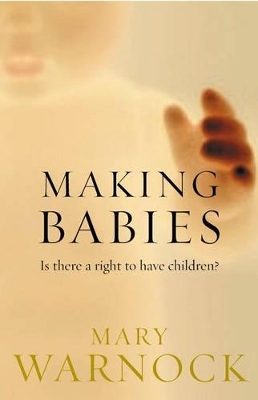
Making Babies
Oxford University Press (Verlag)
978-0-19-280334-4 (ISBN)
The development of new reproductive technologies has raised urgent questions and debates about how and by whom these treatments should be controlled.
On the one hand individuals and groups have claimed access to assisted reproduction as a right, and some have also claimed that this access should be available free of charge. As well as clinically infertile heterosexual couples, this right has been claimed by single women, gay couples, post-menopausal women, and couples who wish to delay having children for various reasons.
Others have argued that a desire to have children does not make it a human right, and, moreover, that there are some people who should not be assisted to become parents, on grounds of age, sexuality, or lifestyle.
Mary Warnock steers a clear path through the web of complex issues underlying these views. She begins by analysing what it means to claim something as a 'right', and goes on to discuss the cases of different groups of people. She also examines the ethical problems faced by particular types of assisted reproduction, including artificial insemination, in-vitro fertilization, and surrogacy, and argues that in the future human cloning may well be a viable and acceptable form of treatment for some types of infertility.
Mary Warnock's work in academic philosophy includes the books Imagination, Memory, and Existentialism. Much of her career was spent at Oxford University, and she ras later Mistress of Girton College Cambridge. She was made a life peer in 1985, and chaired the Committee of Enquiry into Human Fertilisation and Embryology, whose report formed the basis of legislation in the UK. Her most recent book is her autobiography, Mary Warnock: A Memoir.
Introduction ; Techniques of assisted reproduction ; Who pays? ; The right that no stone should be left unturned ; What constitutes a right? ; Do people need to have children? ; A further look at the question of whether there can exist a right to do what is morally wrong ; The moral status of the human embryo ; Back to infertility ; 2. May doctors refuse treatment? ; The slippery slope ; Are those who are not infertile entitled to assisted conception? ; Openness ; Why do homosexuals want children? ; The natural and the unnatural ; The search for security ; Is fear a proper basis for moral judgement? ; Conslusions so far ; Are all methods of fertility treatment legitimate? ; Cloning: 1997-2001
| Erscheint lt. Verlag | 1.10.2002 |
|---|---|
| Verlagsort | Oxford |
| Sprache | englisch |
| Maße | 135 x 204 mm |
| Gewicht | 239 g |
| Themenwelt | Geisteswissenschaften ► Philosophie ► Ethik |
| Studium ► 1. Studienabschnitt (Vorklinik) ► Histologie / Embryologie | |
| Naturwissenschaften ► Biologie | |
| ISBN-10 | 0-19-280334-4 / 0192803344 |
| ISBN-13 | 978-0-19-280334-4 / 9780192803344 |
| Zustand | Neuware |
| Haben Sie eine Frage zum Produkt? |
aus dem Bereich


